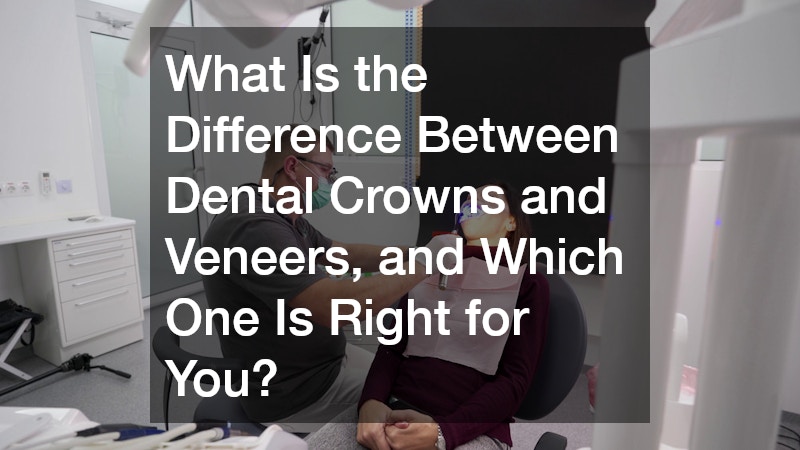Choosing the right dental treatment can be challenging, especially when faced with options like dental crowns and veneers. Both are popular solutions for restoring and enhancing teeth, but they serve different purposes and have distinct characteristics. Understanding the differences between crowns and veneers helps you make an informed decision suited to your dental needs. This article explains what dental crowns and veneers are, their uses, benefits and how to determine which option is right for you.
Understanding Dental Crowns
Dental crowns are custom-made caps that completely cover a damaged tooth. They restore strength, shape, size and appearance, making them suitable for teeth that have undergone significant damage or decay.
Crowns protect weak teeth from further damage and can support teeth with large fillings or after root canal treatment.
The process of getting a crown usually involves two visits to dental clinics. The first appointment includes reshaping the damaged tooth to fit the crown, taking impressions and placing a temporary crown. The second visit involves fitting and cementing the permanent crown.
Crowns are highly durable and can last for many years with proper care. They provide full coverage, which makes them ideal for teeth with extensive damage or structural weaknesses.
Understanding Veneers
Veneers are thin shells of porcelain or composite resin that cover only the front surface of a tooth. They focus on improving the appearance of teeth rather than restoring structural integrity. Veneers are an excellent choice for treating cosmetic issues such as discolouration, minor chips, gaps and slightly misaligned teeth.
Unlike crowns, veneers require minimal tooth reduction. Only a thin layer of enamel is removed from the front surface to allow the veneer to fit flush with the natural tooth. This preservation of the tooth structure makes veneers less invasive.
While veneers offer excellent aesthetic results, they are generally less durable than crowns. They can last for many years, but veneers may chip or crack under excessive force.
Key Differences Between Crowns and Veneers
The primary difference between dental crowns and veneers lies in their coverage and purpose. Crowns cover the entire tooth, providing structural support, while veneers cover only the front surface, focusing on cosmetic improvements.
Crowns are suited for teeth that require significant restoration due to decay, fractures or after root canal treatment. Veneers suit teeth that are structurally sound but need visual enhancement due to discolouration, minor damage or misalignment.
Cost and longevity vary between the two options. Crowns tend to be more expensive and durable, often lasting 10 to 15 years or longer. Veneers usually last around 7 to 10 years but may require replacement sooner if damaged.
Which Option Is Right for You?
Determining whether dental crowns or veneers are the best fit depends on several factors, including the condition of your teeth, your cosmetic goals and recommendations from your dental professional.
If a tooth has extensive decay, a large filling or structural damage, dental clinics usually recommend a crown to provide strength and protection. Crowns are also necessary after root canal therapy to restore the tooth’s function and prevent fractures.
On the other hand, if your teeth are healthy but suffer from cosmetic issues like stains, minor chips or gaps, veneers might be the preferred option. They enhance the smile with minimal alteration to the natural tooth.
Patients concerned about tooth preservation often favour veneers due to the minimal enamel removal involved. However, veneers are not suitable for teeth with significant damage or bite problems.
A consultation with your dentist at the clinics will help determine the most appropriate treatment. They assess your oral health, discuss your expectations and examine your teeth’s condition to recommend the best course of action.
Maintenance and Care
Both crowns and veneers require good oral hygiene to ensure longevity. Brushing twice daily, flossing regularly and attending routine dental check-ups help prevent decay and gum disease around the restorations.
Avoid biting hard objects or using teeth as tools to protect veneers and crowns from damage. Wearing a mouthguard during sports or if you grind your teeth at night can also prolong their lifespan.
While both options are stain-resistant, veneers may be more prone to staining than crowns, especially if made from composite resin. Limiting consumption of staining substances such as coffee, tea and red wine benefits the appearance of veneers.
Choosing between dental crowns and veneers depends on your specific dental needs and aesthetic goals. Crowns provide robust protection and restoration for damaged teeth, while veneers offer a less invasive option to improve your smile’s appearance.
Visiting reputable dental clinics ensures you receive personalised advice and high-quality treatment. The right choice not only improves your smile but also supports your long-term oral health.
If you are considering either treatment, consult your dental professional for a thorough evaluation. Understanding the differences between crowns and veneers empowers you to make an informed decision that best suits your dental health and lifestyle.
.




